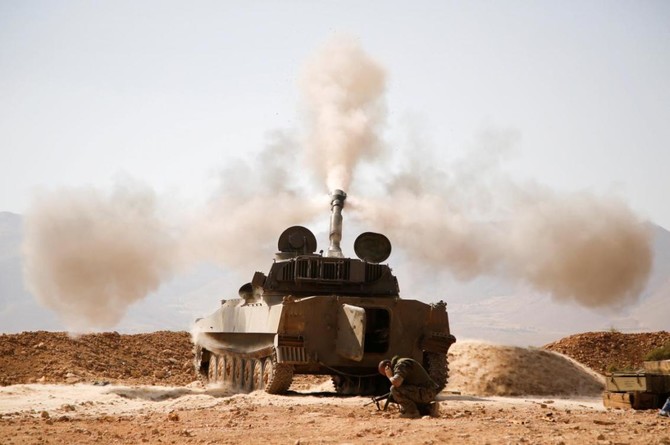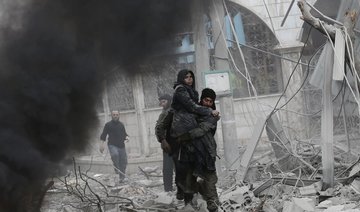BEIRUT: Syrian regime forces and allied militiamen are advancing on the largest remaining opposition-held territory in the country’s north, forcing thousands of civilians to flee toward the border with Turkey in freezing winter temperatures.
The offensive on Idlib was expected after the defeat of Daesh late last year. The Idlib offensive carries significant risks. The province bordering Turkey is home to more than 2.6 million Syrians, according to the UN, including more than 1.1 million who fled fighting elsewhere in the country. A full-blown government offensive could cause large-scale destruction and massive displacement.
Turkey, a supporter of the opposition, has deployed military observers in the province as part of a de-escalation deal with Iran and Russia, but that has not stopped the fighting on the ground or Russian airstrikes against the opposition.
It is not clear how far the current offensive aims to reach, and recapturing the entire province is expected to be a long and bloody process. Opposition activists said the main target for now appears to be the sprawling opposition-held air base of Abu Zuhour, on the southeastern edge of the province, and securing the Damascus-Aleppo road that cuts through Idlib.
On Sunday, government forces recaptured the town of Sinjar, removing a key obstacle to its march toward the air base, according to reports by the state-affiliated Al-Ikhbariya TV. The town of Sinjar is located about 19 kilometers (12 miles) south of Abu Zuhour.
Over the past two months, troops backed by Russian airstrikes have captured more than 80 towns and villages in the northern parts of the nearby Hama province and breached Idlib itself for the first time since mid-2015.
The offensive gained more intensity on Christmas Day, when one of President Bashar Assad’s most trusted and experienced officers took command of the operation to extend the government’s presence toward Idlib and boost security for the road that links the capital, Damascus, with Aleppo, Syria’s largest city.
Brig. Gen. Suheil Al-Hassan, also known among his troops as “Tiger,” has been credited most recently with the defeat of Daesh in much of eastern Syria, including the months-long battle for the city of Deir Ezzor.
“Conditions on the ground are wretched for the opposition,” said an opposition activist based in northern Syria who asked to be identified by his first name, Hassan, for fear of reprisals.
Another opposition activist based in Hama province, Mohammed Al-Ali, said the Russians and the Syrian regime are “carpet bombing” villages before pushing into them.
“The Russian airstrikes, weak fortifications and Daesh attacks in Hama” have all helped regime forces, he said by telephone.
Hassan and Al-Ali said it is highly unlikely that regime forces would march toward the provincial capital, also named Idlib, because it would set up a costly battle with highly experienced and well-armed Al-Qaeda-linked insurgents. The province is dominated by the Levant Liberation Committee, which claims to have severed ties with Al-Qaeda but is widely believed to still be affiliated with it.
Al-Hassan’s chief mission for now appears to be securing the Damascus-Aleppo road.
In December 2016, Assad’s forces captured rebel-held parts of the city of Aleppo, marking the government’s biggest victory since the conflict began. The main road to the capital remained perilous, however, with insurgents attacking it from the west and Daesh from the east. The troops have since driven Daesh back, but the western side remains exposed.
Four days after Al-Hassan took over operational command, troops managed to break through the militants’ heavy defenses and capture the town of Abu Dali, a link between Hama, Idlib and Aleppo.
Since then, thousands of people have been fleeing with their belongings amid harsh cold weather toward safer areas further north, including Idlib city and areas near the border with Turkey. Pro-opposition media said that more than 5,000 families have fled the violence over the past two weeks, some renting homes or staying in tents in open fields, others left homeless.
Last week, government forces advanced to within around 12 km of Khan Sheikhoun, where a sarin nerve gas attack killed more than 90 people last year, prompting the US to launch a missile attack on Assad’s troops. Experts from the UN and other monitoring groups blamed the chemical attack on the government, which denied responsibility.
The Britain-based Syrian Observatory for Human Rights, which monitors the fighting through a network of activists, said that some 43 civilians, 57 militants and 46 pro-government forces have been killed since the offensive led by Al-Hassan began on Dec. 25.
“The regime wants to take the eastern part of Idlib province,” said the Observatory’s chief, Rami Abdurrahman. “Their aim is to remove any threat to the road” between Damascus and Aleppo, he said.
Battle looms for Idlib after Daesh defeat
Battle looms for Idlib after Daesh defeat

Israeli soldiers fired 900 bullets during massacre of Palestinian aid workers, investigation finds

- Researchers use visual and audio analysis to reconstruct Gaza ambush of emergency vehicles that left 15 people dead
- Israeli troops executed some victims at close range, according to recordings and witnesses
LONDON: Israeli soldiers fired more than 900 bullets during a massacre of Palestinian aid workers that included “execution-style” killings, a detailed reconstruction of one of the worst atrocities of the Gaza war has found.
The investigation recreated a 3D digital version of the scene of the killings and used audio analysis of recordings to pinpoint how the attack unfolded in March last year.
Fifteen Palestinian aid workers were killed when Israel troops ambushed their vehicles in Tel Al-Sultan, near Rafah, southern Gaza. The victims included ambulance crews from the Palestinian Red Crescent Society, rescue teams from the Palestinian Civil Defense sent to help, and a member of the UN agency for Palestinian refugees UNRWA.
Israel tried to hide evidence of the killings by crushing the vehicles left at the scene and burying them in the sand, along with the victims’ bodies.
The joint investigation published on Monday was carried out by London-based researchers Forensic Architecture and Earshot, an audio analysis agency.
Israeli soldiers “subjected Palestinian aid workers to continuous assault by gunfire for over two hours” in an attack that started shortly after 5 a.m. on March 23, the study found.

Contrary to Israel’s initial claims that events unfolded in a combat zone, “there was no exchange of fire in the area, and no tangible threat to the safety of those soldiers,” the report said.
The researchers documented at least 910 gunshots from three recordings from the scene. At least 844 shots were recorded within a five-and-a-half-minute period in video taken by paramedic Refaat Radwan, one of the victims.
More than 90 percent of the bullets were fired directly toward the emergency vehicles and aid workers during the initial period of the attack, with at least five soldiers firing simultaneously.
The investigation concluded that the emergency lights and markings of the vehicles ambushed would have been clearly visible to the soldiers.
Israeli troops continued shooting as they advanced on the vehicles before carrying out perhaps the most disturbing act of the attack.
“Upon reaching them, they moved through the vehicles and shot several of the aid workers at close range,” the report said.
One of the shots was fired between one and four meters away from paramedic Ashraf Abu Libda and coincided with the last time his voice was heard on recordings, “suggesting that these were the shots that killed him.”

The initial attack started at about 4 a.m. when Israeli forces opened fire on an ambulance sent to the scene of an Israeli airstrike, killing the two crew members inside.
Three more ambulances were sent to search for the missing crew. Once they found the vehicle, they were joined by a Palestinian Civil Defense ambulance and a fire truck.
“All vehicles were clearly marked and had their emergency lights on,” the report said.
Within minutes of the five vehicles arriving at the scene, and as the aid workers approached their fallen colleagues, the Israeli soldiers opened fire.
The driver of a UN Toyota truck that passed the site about an hour later was also killed.
Researchers were able to map the positions and movements of the Israeli troops throughout the attack with the help of echolocation and audio-ballistic analysis.
Opinion
This section contains relevant reference points, placed in (Opinion field)
This enabled them to work out the distance and the direction of the source of the gunshots from the devices making the recordings.
Researchers also detailed the extent of the Israeli military’s efforts to “conceal and disrupt evidence of the attack.”
This included burying the victims’ bodies, burying mobile phones, and crushing and partially burying the victims’ vehicles.
Analysis of satellite images revealed how Israel transformed the site with earth-moving machinery in the hours following the attack.
One of the two survivors of the ambush was detained for more than a month, tortured, and interrogated.
The bodies of 14 of the victims were found in a mass grave near the site on March 30, while the remains of another victim were found a few days earlier nearby.
A forensic doctor who examined some of the bodies told The Guardian newspaper that there was evidence of execution-style killing given the location of the wounds.
Coming during the height of Israel’s two-year war on Gaza that has killed more than 72,000 Palestinians, the massacre of aid workers sparked international outcry.
In the aftermath, Israel gave varying accounts of what happened, initially claiming that its troops thought they were facing an attack.
On April 20, the Israeli military said an inquiry into the attack had identified “several professional failures, breaches of orders, and a failure to fully report the incident.”
A duty commander was dismissed for “providing an incomplete and inaccurate report during the debrief,” but there have been no further measures against those who carried out the attack.












